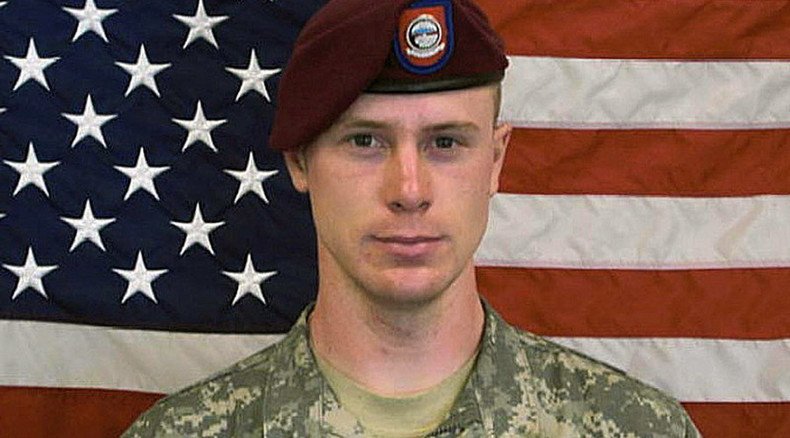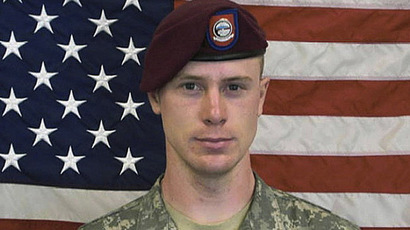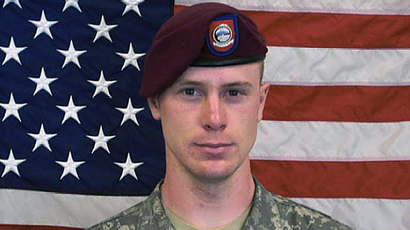Former POW Bergdahl faces rare 'misbehavior before the enemy' charge

In addition to desertion, US Army Sgt. Bowe Bergdahl, an ex-prisoner-of-war who abandoned his post in Afghanistan before being held by the Taliban for five years, has been charged with a seldom-used area of military law that could mean a life sentence.
Bergdahl, 29, faces a rare, World War II-era charge known as misbehavior before the enemy for allegedly endangering fellow US soldiers when he "left without authority; and wrongfully caused search and recovery operations."
The charge allows the military authorities to allege that Bergdahl not only deserted his unit, but that he put them in harm's way amid the search for his whereabouts.
READ MORE: Army Sgt. Bowe Bergdahl charged with desertion
"You're able to say that what he did had a particular impact or put particular people at risk. It is less generic than just quitting," Lawrence Morris, a retired Army colonel who has served as the branch's top prosecutor and top public defender, told the Associated Press.
Checking my pockets for sympathy for Bowe Bergdahl. Can't find any.
— Roy Abrams (@RQA) September 8, 2015New charges could put Bowe Bergdahl in prison for life, but I'm sure Obama will pardon his little traitor.
— Paulsy (@Paulsy01) September 8, 2015Nearly 500 cases of misbehavior before the enemy were tried against US soldiers in Europe from 1942 to 1945, according to a Military Law Review article cited by AP. Since then, there is scant evidence that the charge has been used with any regularity.
Desertion, Bergdahl's initial charge, has been used by Army prosecutors about 1,900 times between 2001 and 2014. Desertion comes with a maximum sentence of five years in prison.
READ MORE: ‘Bergdahl may face confinement, but not a significant term’
Bergdahl is scheduled to appear in court for an Article 32 hearing on Sept. 17 at Fort Sam Houston, Texas, a proceeding similar to a civilian grand jury.
The charge of misbehavior is part of Article 99 of the military justice code, which includes nine different offenses such as cowardice or triggering false alarm.
"It is of course more complicated than the desertion charge, not as well understood, a higher burden on the government to prove," Morris said.
For example, a Marine lance corporal was charged with misbehavior after pleading guilty for refusing to offer security for a convoy leaving a base in Iraq in 2004.
Bergdahl's attorney says his client is being charged twice for the same action. "It's unfortunate that someone got creative in drafting the charge sheet and figured out two ways to charge the same thing," Eugene Fidell said in March.
LISTEN MORE:
READ MORE: Bergdahl platoon mates plan book, movie about his ‘premeditated’ desertion
Bergdahl went missing from the US army base in Afghanistan’s Paktika province in June 2009. He was captured and reportedly held in Pakistan, until he was ransomed and exchanged in May 2014 for five men associated with the Taliban who were detained at Guantanamo Bay.
Members of his battalion have claimed Berghdal had talked openly about leaving the Army prior to his disappearance, and were convinced he had willingly deserted. According to some, no fewer than six US troops died in the three weeks after Bergdahl’s disappearance as a result of search efforts aimed at recovering him. The Pentagon has said that it has no proof that anyone died amid search efforts for Bergdahl.
Since his repatriation in June 2014, Bergdahl has been assigned to administrative duties at Fort Sam Houston in Texas.
READ MORE: US to allow families of hostages to pay ransom, but govt will not do it
The prisoner exchange deal for Bergdahl, negotiated by the White House, has been criticized roundly by President Barack Obama's political opponents. In June, Obama announced a change in policy that would allow families of US hostages to pay ransom to terrorists without fear of prosecution, and US government officials to talk with terrorists on families’ behalf.
It is still illegal for the US government to pay ransoms directly, or make concessions to alleged terrorists. There was no change to the existing laws making it a crime to provide money or other material support to terrorists.
"I am reaffirming the US will not make concessions, such as paying ransoms, to terrorist groups holding hostages," Obama said.
The Justice Department will not prosecute anyone for paying ransom to a terror group, however.














